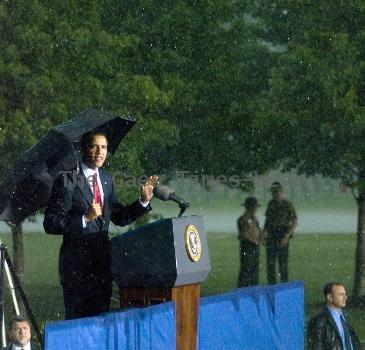Clinton says ’steel vise’ is ’slowly crushing’ global activists, threatening some democracies
By Robert Burns, APSaturday, July 3, 2010
Clinton: ‘Steel vise’ crushing global activists
KRAKOW, Poland — Intolerant governments across the globe are “slowly crushing” activist and advocacy groups that play an essential role in the development of democracy, U.S. Secretary of State Hillary Rodham Clinton said Saturday.
She cited a broad range of countries where “the walls are closing in” on civic organizations such as unions, religious groups, rights advocates and other nongovernmental organizations that press for social change and shine a light on governments’ shortcomings.
Among those she named were Zimbabwe, the Democratic Republic of Congo, Ethiopia, Cuba, Egypt, Iran, Venezuela, China and Russia.
“Some of the countries engaging in these behaviors still claim to be democracies,” Clinton said at an international conference on the promotion of democracy and human rights. “Democracies don’t fear their own people. They recognize that citizens must be free to come together, to advocate and agitate.”
Before an audience of several hundred senior government officials, Clinton recalled Winston Churchill’s warning 60 years ago at Fulton, Mo., that an iron curtain was descending across Europe. She noted that with the collapse of the Soviet Union, that curtain no longer remains.
“But we must be wary of the steel vise in which governments around the world are slowly crushing civil society and the human spirit,” she said. Social activists, Clinton said, are being harassed, censored, cut off from funding, arrested, prosecuted or killed.
President Barack Obama, in a statement released in Washington, said the United States is particularly concerned about “the spread of restrictions on civil society, the growing use of law to curb rather than enhance freedom and widespread corruption that is undermining the faith of citizens in their governments.”
Clinton’s speech came at the opening of a 10th anniversary celebration of the founding of the Community of Democracies, which has 16 members and is meant to forge international consensus on ways to support and promote democracy.
She recommended that the organization set up an independent means of monitoring repressive measures against social advocacy groups, and that the U.N. Human Rights Council do more to protect civil society. She announced that the U.S. would contributed $2 million to support the work of embattled nongovernmental groups.
Poland was a fitting setting for Clinton’s address. The country escaped from decades of totalitarianism in the downfall of the Soviet Union and the collapse of communism across Eastern Europe in the early 1990s — thanks largely to the efforts of the Polish labor movement, Solidarity — whose founder, Lech Walesa, was in the audience for the speech. Poland was holding a presidential runoff election Sunday.
Earlier Saturday, Clinton expressed hope that Russia would drop its opposition to a U.S. missile defense system in Europe and accept an offer to cooperate in developing technologies for shooting down hostile weapons.
“The offer stands,” Clinton told a news conference after witnessing the signing of an amendment to a U.S.-Polish agreement on the basing of U.S. missile interceptors in Poland.
Repeating a theme the Russians consistently have rejected, Clinton said Moscow has nothing to fear from a NATO-endorsed missile defense system based in Europe because it will be aimed at Iran’s missile arsenal.
“This is a purely defensive system,” she told reporters, with her Polish counterpart, Radek Sikorski, at her side. “It does not threaten Russia.” Moscow views the project as a potential threat to its own missile arsenal.
Sikorski said his country fully supports the project, which the Obama administration radically altered last year in a move that some critics interpreted as a conciliatory gesture to Russia and a slap at Poland.
The Bush administration had planned to install 10 missile interceptors in Poland and a tracking radar in the Czech Republic. President Barack Obama decided to reconfigure the system to account for what he said were changes in the nature of the Iranian missile threat. Obama’s system eventually would include land-based SM-3 anti-missile interceptors in Poland; the early elements are largely sea-based.
The amendment signed Saturday was a technical adjustment to reflect Obama’s changes.
Upon her arrival from Ukraine, Clinton laid a wreath and paid her respects at the Katyn Cross, a memorial to the nearly 100 Poles killed in an April plane crash in Russia en route to commemorate the 70th anniversary of the Soviet massacre of Polish POWs in Katyn forest. Among those killed in the plane crash was Poland’s president, Lech Kaczynski.
Clinton also toured the World War II-era Schindler Factory Museum, which captures in stark images and artifacts the suffering of Jews at the hands of Nazi Germany. Oskar Schindler, a German industrialist, is credited with saving the lives of hundreds of Jews by bringing them to his factory in Krakow from the nearby Plaszow concentration camp.
Clinton spoke in somber tones of the haunting symbols inside the museum.
“We see here the two realities of the Holocaust,” she said — the privation and slaughter of Jews, as well as the heroic efforts by some to save them from Plaszow.
She said the Obama administration would seek congressional approval of a $15 million donation, over five years, to the Auschwitz-Birkenau Foundation to help finance an endowment to preserve and safeguard the remains of the Auschwitz-Birkenau concentration camp. An estimated 1.1 million victims perished at the camp.
Clinton later flew to Baku, Azerbaijan.
Online:
Clinton’s itinerary: tinyurl.com/39ozdur
Tags: Accidents, Azerbaijan, Baku, Barack Obama, Czech Republic, Eastern Europe, Eu-clinton, Europe, Iran, Krakow, Middle East, North America, Poland, Political Organizations, Russia, Special Interest Groups, Transportation, United States



